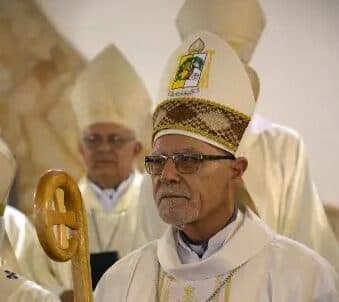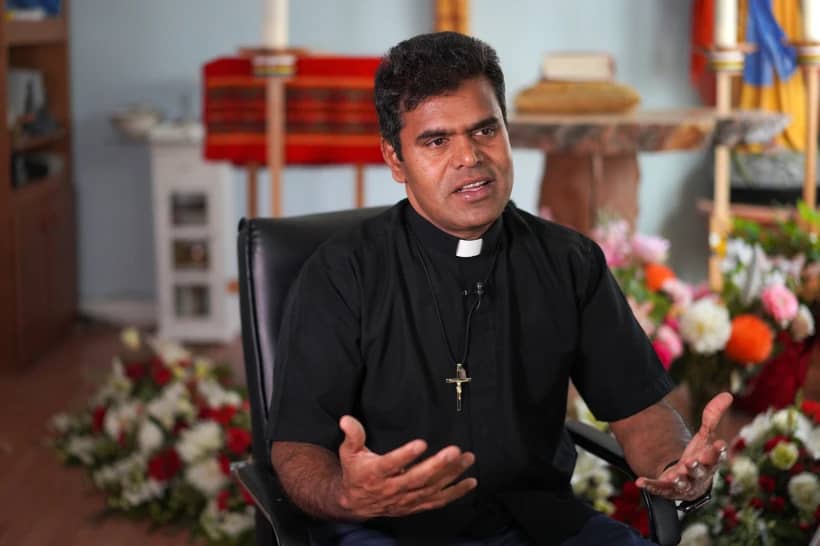SÃO PAULO, Brazil – With a mission in Paraguay that began 40 years ago, the new bishop of Pilcomayo – a vicariate in the Chaco mostly inhabited by Indigenous groups – German-born Miguel Fritz, was defined by Cardinal Adalberto Martínez as a “shepherd with the smell of sheep,” repeating an analogy famously used by Pope Francis in different occasions.
Martínez, who presided over the ordination of Fritz on Jul. 14, emphasized that he devoted his whole life to the mission in Paraguay and was able to learn much about his flock over the decades.
“You wanted to be a missionary (…) at the farthest reaches of the world, on the geographical and existential peripheries until today. For Europe, then and now, Paraguay is a small, unknown dot on the world map. And that’s where you ended up 40 years ago,” Martínez said, according to the local newspaper ABC Color.
Indeed, throughout his tenure as a missionary in the Chaco region, Fritz got involved in many social struggles, always defending the right of the Indigenous population to their traditional lands.
“No Indigenous group has enough land in Paraguay. In the eastern part of the country, big landowners buy the support of the judiciary and the police and just expel the natives from their villages,” Fritz said.
On the western side, in the Chaco, many Indigenous peoples received their lands decades ago, but the government has never provided the areas’ deeds, he added.
“Part of those areas have been invaded by non-Indigenous groups, especially Mennonites,” the bishop said. Mennonite cooperatives lead Paraguay’s milk and beef production.
The local church has collaborated with the Indigenous in several ways. It filed a lawsuit, for instance, aiming at the eviction of the occupiers from the Indigenous lands, but they remain in the zone till now.
In regions of the Chaco near the Brazilian border, the Indigenous groups have to deal with the continuous pressure and invasion of their lands by Brazilian soy producers.
“At the same time, the production of transgenic cotton has been gaining terrain all over the country, equally exerting pressure on Indigenous lands,” Fritz added.
Over the past month, Indigenous activists have blockaded roads in order to protest for basic rights, including for access to the electricity grid and for healthcare.
Hilaria Cruzabie, a member of the Guarani people and a resident of the Chaco, told Crux that native groups face several challenges in the region, not only the ones related to concrete life, but also those in the religious dimension.
“The communities tend to be distant from each other, so evangelizing them is not easy. At the same time, new Christian churches have been appearing in the region, and part of the people end up converting,” she said.
Cruzabie, who is an Eucharist minister and a member of the Santa Teresita community, said that much has been changing in the Chaco over the past years. Years ago, it was a land of Indigenous peoples. Now, many non-Indigenous live there as well, she declared.
“I think Father Fritz will have a stronger voice, now that he is a bishop. But in reality he has always had one. He knows our situation and has always defended us,” she said.
Born in Hannover and raised near Frankfurt, Fritz was ordained a priest and a member of the Oblates in Germany and arrived 40 years ago in Paraguay and 37 years ago in the Chaco. He didn’t know exactly what to expect when he was sent to Paraguay, the sole country in South America where the most spoken language is an Indigenous one, Guarani.
He was also unable to predict how life was going to be as a missionary in the Chaco, a region mostly inhabited by Indigenous peoples.
“I tried to follow the steps of my mentor, Father José Seelwische, also an Oblate, who produced the first dictionary of the [Indigenous] nivaclé language,” he said. Fritz equally decided to study Anthropology.
Over the past three years, the priest had been playing the role of diocesan administrator. Pope Francis, during his final hospitalization, appointed Fritz as the new bishop. But the officialization only came with Leo XIV.
“That’s a country marked by Catholicism. I hope my voice can help to bring visibility to the plight of Indigenous population in Paraguay,” he said.













